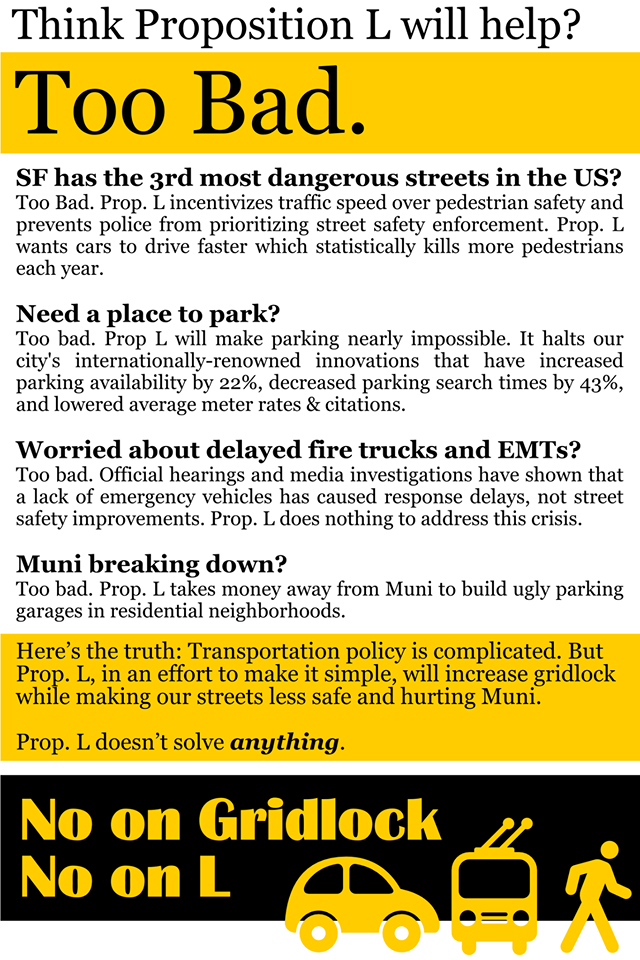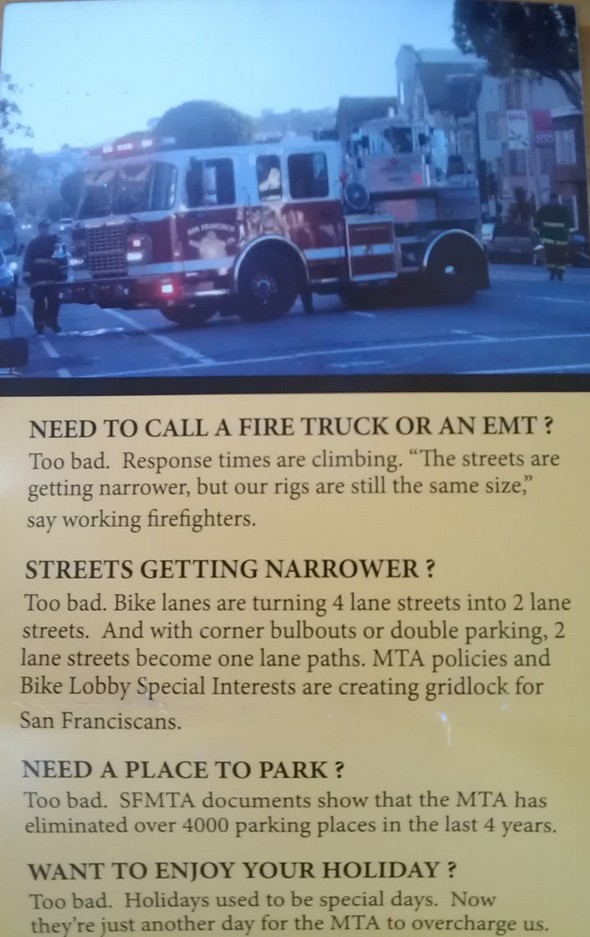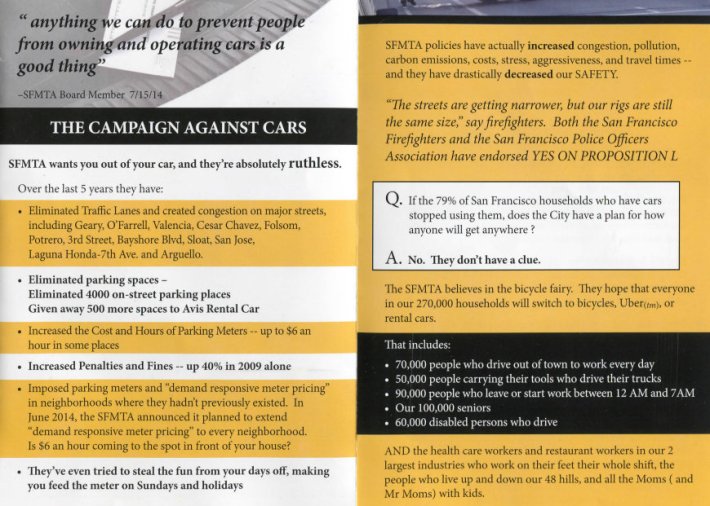We may never know why Sean Parker decided to pour tens of thousands of dollars into Proposition L, a measure crafted and funded by Republicans who want to enshrine 20th-century car-centric policies in San Francisco. With his contribution, Parker decided to amplify this "primal scream from motorists," as the Bay Guardian put it.

On Tuesday, the measure will go to voters, who will either approve an advisory measure that contradicts SF's 41-year-old Transit-First Policy, or send a signal that they want to put the era of automobile-centric streets behind us.
If Parker's recent interview with Fortune Magazine is to be believed, his donation to Prop L was motivated by the sorely misguided belief that it will help less affluent San Franciscans:
It’s hard to figure out Parker’s own politics. His own priority is inequality. His political team – yes, he has a political team – flagged the referendum, called Proposition L, because it struck them as a hidden tax on the poor...
“I have a long-standing frustration that the only people who are significantly disadvantaged by onerous DMV regulations and parking tickets are the working poor,” Parker says.
"However," as Fortune's Shalene Gupta explains, "Parker’s enthusiasm is wildly out of sync with San Francisco’s politics."
He's also out of sync with the growing body of research that indicates the working poor in San Francisco are more likely to walk and ride Muni than own cars.
Fifty-three percent of Muni riders identify as low-income, according to a recent SFMTA survey [PDF]. And while there's limited data available on the income of car owners, a congestion pricing study by the SF County Transportation Authority found that 95 percent of drivers to, from, and within the downtown area during the morning rush are from households making more than $50,000 annually.
Meanwhile, free and underpriced parking causes drivers to circle around for spots, creating traffic that slows down Muni and its mainly low-income ridership.
“It’s manipulative to say this policy supports low-income workers,” Walk SF Executive Director Nicole Schneider told Fortune.
Not that Prop L's proponents care about truth or accuracy. They misleadingly tout a false statistic (erroneously reported by SFMTA, and since corrected) that 79 percent of SF households own cars, seemingly arguing for majority rule. The actual number [PDF] is 69 percent, and 41 percent own only one car, giving SF a solid car-light majority.
Most San Franciscans use multiple forms of transportation, and by making it easier to get around without a car, policies that improve transit, biking, and walking also make it easier for San Franciscans to shed the enormous costs of owning, maintaining, insuring, and fueling a motor vehicle. This can drastically lower household costs for working families, but Prop L's proponents attack efforts to make non-driving choices more attractive.
Maybe that's why Prop L has been roundly rejected by SF's Democratic political establishment -- no current office holder has endorsed it. Among the opponents that Prop L spokesperson and political consultant David Looman called "Kool-aid drinkers" in a recent San Francisco Magazine article are eight supervisors as well as the SF Democratic County Central Committee.

What exactly do Prop L supporters want to change? Well, the flyers handed out by Prop L campaigners rail against a list of road diet projects that have made streets safer, saying they exemplify the SFMTA's "ruthlessness" in getting "you out of your car." The flyer points to streets like Valencia, Cesar Chavez, Folsom, Potrero, Third Street, Bayshore, San Jose, Sloat, and Laguna Honda/Seventh Avenue. Redesigns on these streets have "eliminated traffic lanes and created congestion on major streets," the flyer says. (Oddly, a few of the streets listed, like Geary and O'Farrell, haven't been re-configured in decades.)
"That's one of the most tone-deaf things I've ever seen in San Francisco politics," said Peter Lauterborn, the No on L campaign manager, and an aide for Supervisor Eric Mar (who is unaffiliated). "That they would be so unaware of the tragedies and deaths that have occurred [on those streets], like it's some sort of crazy conspiracy to hurt drivers."
Of course, the vast majority of street space in San Francisco is still devoted to moving and storing private automobiles, mostly for free.
One pro-Prop L flyer alarmingly announces that the SFMTA has "elminated 4000 on-street parking spaces." If that's accurate, it's less than 2 percent of SF's 275,450 on-street spaces, re-purposed for safer streets and better transit. In an apparent reference to the on-street car-share program that's just kicked off -- a proven method to open up parking spaces by making it easier to get live without a personal car -- the flyer says the SFMTA has "given away 500 more spaces to Avis Rental Car," which owns ZipCar and will pay for previously free spots.
The Prop L campaign's willingness to lie in order to scare up some votes is especially apparent in one flyer that cites "an SFMTA Board Member" as saying on July 15, "Anything we can do to prevent people from owning and operating cars is a good thing."
Here's the actual quote they're referring to, from SFMTA board member Cheryl Brinkman in a discussion about on-street car-share:
Even if you don’t own a car, every citizen has the right to use that curb space. Anything that we can do to help people live in this city without owning a personal car is a win for all of us. Whether we own a car, rent a car, bike, walk, or take a bus, fewer cars is a good thing.
"There are challenges and nuances" to transportation planning and policy, said Lauterborn. "They're just showing how little they know about how transportation works, who uses public transit, and that all of us really need safe streets."







